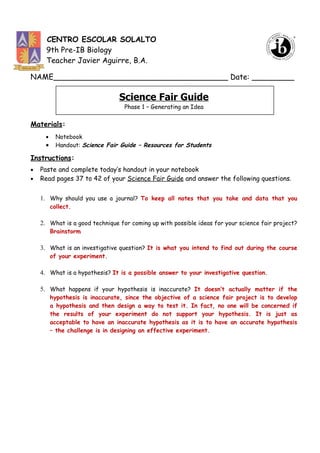
Phase 1 generating and idea (pp.37-42) answer key
- 1. CENTRO ESCOLAR SOLALTO 9th Pre-IB Biology Teacher Javier Aguirre, B.A. NAME_____________________________________ Date: _________ Science Fair Guide Phase 1 – Generating an Idea Materials: • Notebook • Handout: Science Fair Guide – Resources for Students Instructions: • Paste and complete today’s handout in your notebook • Read pages 37 to 42 of your Science Fair Guide and answer the following questions. 1. Why should you use a journal? To keep all notes that you take and data that you collect. 2. What is a good technique for coming up with possible ideas for your science fair project? Brainstorm 3. What is an investigative question? It is what you intend to find out during the course of your experiment. 4. What is a hypothesis? It is a possible answer to your investigative question. 5. What happens if your hypothesis is inaccurate? It doesn’t actually matter if the hypothesis is inaccurate, since the objective of a science fair project is to develop a hypothesis and then design a way to test it. In fact, no one will be concerned if the results of your experiment do not support your hypothesis. It is just as acceptable to have an inaccurate hypothesis as it is to have an accurate hypothesis – the challenge is in designing an effective experiment.
